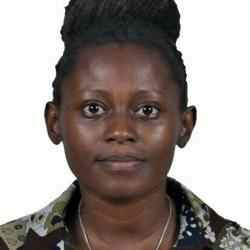Introduction
Jane Sieh works with adolescent girls from the slums of Campinas, SP, offering them an alternative to life on the street.
The New Idea
A phrase from Mother Theresa of Calcutta captures the spirit of Jane Sieh's "Project Spring." "We don't know how to do great things, but we do little things with great love." Sieh refers to those words in describing her work with adolescent girls from a slum in Campinas, a satellite city of Sao Paulo. Campinas enjoys one of the highest per capita income and education levels in Brazil, but as industry flourishes slums grow as well.Jane's project, now ten years old, offers to girls ages 11 to 15 means to develop self-esteem and skills along with family, community and workplace relations. The girls spend off-school hours at Sieh's center where the focal activity is producing embroidered greeting cards. They manage production and share profits, but as they learn to design, make and market the cards, their interpersonal relations reinforce values largely missing in their poor community and their homes."Our idea is that the woman is a strong force in family-building," Sieh explains. "In Brazil, the woman has been relegated to second place, but we know that she can indeed change the environment where she lives. Even if the girls don't immediately have the capacity to change, we give them the seeds to carry so when they become young women they remember, and the seeds grow and have flowers."Biweekly meetings with the girls' mothers strengthen the families' participation in the girls' development and bring the family more into the sphere of values the girls learn at the center.Sieh cites the low school dropout rate of "Project Spring" participants as an indicator that it has a strong and positive influence in their lives. Of the 180 girls in the Campinas program, only six or seven are not in school this year. The dropout rate in their area is tremendous, as are the pressures on them personally to drop out.A teacher at a local school says the girls of Project Spring are leaders who make the best grades and are the most cooperative.A success story Sieh likes to tell is that of a girl who came into the project at age 11 and now, at 17, earned a college scholarship through the sale of Project Spring greeting cards. She is the daughter of a stonemason and plans to study biotechnology."She's constantly giving her testimony to the younger girls and encouraging them to really hold onto opportunities," Sieh says. "We've had very heartwarming experiences seeing how these girls change. We remember them from the first day we saw them and see how they've been transformed into another person. They have that sense of having tremendous backing behind them. The adult figure is very important in the adolescent, formative years, and with most of these girls, the parents are absent a great deal of the time."Unsupervised girls in the slums easily fall into street life that's difficult to leave."The street is a fascinating environment, and once they're out there testing the freedom, no matter how harsh that freedom is, it's too late," Sieh says. "Our program is to help take the girls in before they go to the street. It's preventive."A second center opened with 15 girls last year in another satellite city of Sao Paulo. This year it has 100 girls and 20 volunteers.Project Spring produces a catalog of the embroidered greeting cards designed exclusively by the girls. The catalog is distributed worldwide, and card sales jumped from 5,000 last year (1989) to 7,000 this year. By the time the girls have completed the program, they've gained skills and an awareness of their rights and responsibilities in the world of work.
The Problem
The particular problems of adolescents, especially young girls, are not widely recognized in Brazil. Those who live in the slums do not have access to what few programs exist. Adolescent girls living in impoverished communities, particularly urban slums, are especially vulnerable to drugs and the quick money that comes from prostitution, which is often encouraged by their own families. These girls grow up with no sense of self worth, in an environment where everyone struggles to survive and personal needs are given very little attention. As Sao Paulo continues to grow, the slums will increase and filter out into neighboring regions such as Campinas, thus creating even more pressures on the ability of the population to survive. Sieh wants to drain the favelas by continuing to take young girls away from such an environment and providing them with skills and self-respect.
The Strategy
The program primarily targets girls 11 to 15 years old and is divided into three 12-month periods that focus on different aspects of growth.The first deals mainly with the girl's self-image. Seminars call attention to personal issues including health, hygiene and drug and alcohol awareness. The girls begin learning handicrafts such as the embroidery they will need to make the greeting cards. They participate, too, in "Project Spring" social events.The second year turns more toward the girl's relationship with others. She is encouraged to think about how she relates to her family, friends, colleagues, the opposite sex and society as a whole. By looking more closely at these relationships, she develops a more mature understanding of them. Also during this phase, the girls earn their first income from producing the greeting cards.The third phase looks further outward to the community and to the girl's future career. She visits workplaces and talks with people in various lines of work. The girls at this stage take on greater responsibilities in the production and sale of the greeting cards and good work habits and exhibiting their work. They receive study grants for classes in Portuguese, mathematics and secretarial and computer skills. A library reinforces what they learn in these courses.Through the program, the girls acquire skills and values not only to enrich their lives but also to benefit their families and communities.
The Person
Jane Sieh is Chinese, from a wealthy, conservative, Buddhist family that believed poverty is inevitable. She emigrated to the United States and as a convert to Catholicism, felt a personal responsibility to work for social justice. She and her husband moved to Brazil, where she became aware of young prostitutes on the street.With their four children now grown, Jane devotes herself to Project Spring.




